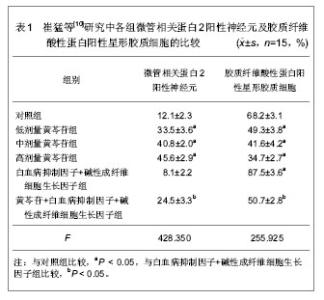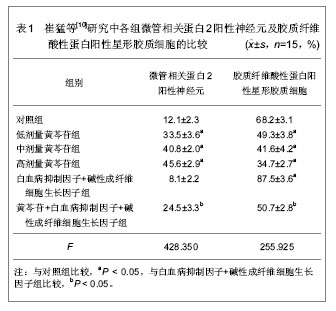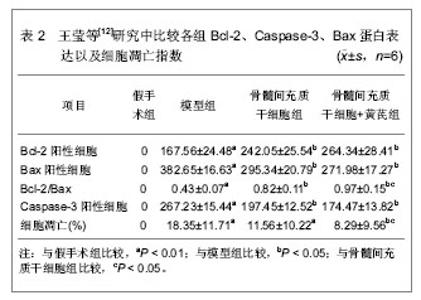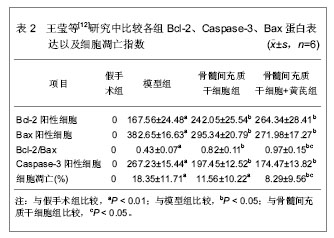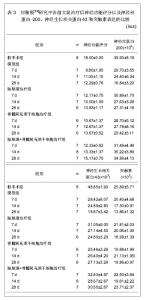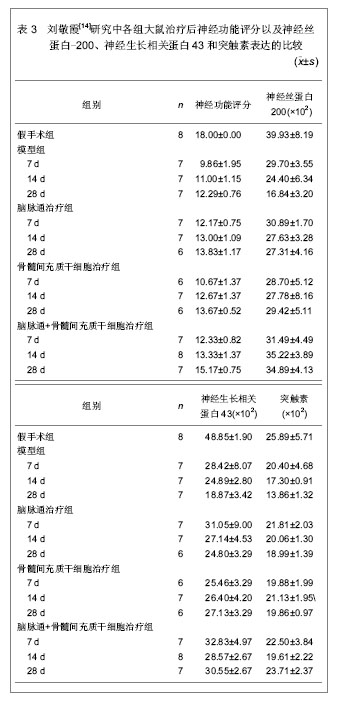| [1] Reynolds BA, Weiss S. Generation of neurons and astrocytes from isolated cells of the adult mammalian centralnervous system. Science.1992;255(5052):1707.[2] 万方数据库.万方医学网[DB/OL].2013-09-21. https://med.wanfangdata.com.cn[3] Medline.Pubmed[DB/OL].2013-09-21.http://www.ncbi.nlm.nih. gov/pubmed/[4] Dietrich J, Easterday MC.Developing concepts in neural stem cells.Trends Neurosci.2002;25(3):129-131.[5] Gage FH.Mammalian neural stem cells.Science. 2000;287 (5457):1433-1438. [6] Jin K, Minami M, Lan JQ, et al.Neurogenesis in dentate subgranular zone and rostral subventricular zone after focal cerebral ischemia in the rat.Proc Natl Acad Sci U S A. 2001; 98(8):4710-4715.[7] Yagita Y, Kitagawa K, Ohtsuki T, et al.Neurogenesis by progenitor cells in the ischemic adult rat hippocampus.Stroke. 2001;32(8):1890-1896.[8] Temple S.The development of neural stem cells.Nature. 2001; 414(6859):112-117.[9] 解俊领,张玥,黄小杰,等.大鼠胚胎神经干细胞与永生化神经干细胞系C17.2定向分化为神经元潜能的差异[J].解剖学报,2012, 43(5):581-587.[10] 崔猛,冯世庆,范宁建,等.黄芩苷下调p-STAT3诱导神经干细胞向神经元分化[J].天津医药,2013,41(8):786-788.[11] 张全伟,赵兴绪,赵红斌,等.红景天苷体外诱导大鼠骨髓间充质干细胞分化为神经元样细胞[J].中国组织工程研究,2012,16(14): 2496-2504.[12] 王莹,李文媛,贾桦,等.黄芪皂甙Ⅳ联合骨髓间充质干细胞移植对大鼠脑缺血/再灌注损伤海马神经元凋亡及相关基因表达的影响[J].解剖科学进展,2011,17(4):355-360.[13] 杜伟国,徐成贺.《内经》对脑髓学说的认识[J].中医药研究,2001, 17(4):3-4.[14] 刘敬霞,刘轲,李建生,等.脑脉通联合骨髓间充质干细胞移植对脑缺血大鼠神经元突触重建的影响[J].时珍国医国药,2013, 24(4): 940-943.[15] 俞天虹,储利胜,刘志婷,等.不同黄芪剂量的补阳还五汤对大鼠脑缺血后神经干细胞增殖的影响[J].中国实验方剂学杂志,2013, 19(7):182-185.[16] 张德凤,潘家华,张梅,等.丹参联合骨髓间充质干细胞移植治疗新生鼠缺氧缺血性脑损伤的实验研究[J].实用儿科临床杂志,2011, 26(2):142-145.[17] Cotzias GC, Van woert MH, Schiffer LM. Aromatic amino acids and modification of parkinsonism. N Engl J Med.1967; 276(7):374-379.[18] Piccini P, Pavese N, Hagell P, et al. Fators affecting the clinical outcome after neural transplantation in Parkinson’s disease. Brain.2005;128(12):2977-2986.[19] Yu Y, Gu S, Huang H, et al. Combination of bFGF, heparin and laminin induce the generation of dopaminergic neurons from rat neural stem cells both in vitro and in vivo. J Neuro Sci.2007;255(1-2):81-86.[20] 施慧芬,路煜,宋杰,等.止颤汤干预神经干细胞移植帕金森病大鼠脑内多巴胺及其代谢产物的变化[J].中国组织工程研究与临床康复,2011,15(36):6772-6775.[21] 柯春龙,陈白莉,郭少雷,等.三七总皂甙对神经干细胞诱导分化多巴胺能神经元移植帕金森大鼠的影响研究[J].中国老年学杂志,2008,28(19):1881-1883.[22] 杨辉,况时祥,易健.益气升阳法对骨髓间充质干细胞移植治疗血管性痴呆大鼠学习记忆的影响[J].贵阳中医学院学报,2011, 33(4):33-35.[23] 邬伟,杨景全,何志勇,等.人参皂苷Rg1联合骨髓间充质干细胞移植对痴呆大鼠学习记忆能力的影响[J].中国中西医结合杂志, 2011,31(6):799-802. |
